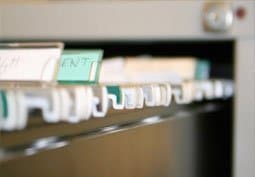By: Jeff Ousley
With the sheer amount of paperwork needed to maintain a household, many of us struggle with what to keep and what to throw away. Bills, bank statements, insurance policies and credit card information often blend together into one unintelligible pile. How do we know what is safe to pitch?
Developing a solid financial records management system can help you and your loved ones navigate your personal and financial documents in case of a major life event.
What to Keep
There’s a temptation to err on the side of caution and just keep everything. Aside from the inevitable clutter that causes, the problem with that is it makes it near impossible to find anything when you need it. Taking the time to throw away or shred paperwork you no longer require should help with this problem.
Above is a short list of common household documents, courtesy of USA.gov.
There are a few documents that you never want to discard under any circumstances. These include items such as:
- Birth certificates
- Social security cards
- Marriage license
- Education records
- Military service records
- Household inventory
- Life insurance policies
Taking the time to keep your paperwork current will pay dividends down the road as it becomes much easier to remain organized.
Easy Access vs Long Term Storage
You don’t need to worry about having immediate access to all your paperwork all the time. Many experts recommend creating an “active file” where you can keep documents that you refer to on a regular basis. These would include items such as:
- Bills/bill payment receipts
- Bank statements
- Employment records
- Health records
- Insurance policies
- Password list
Most of these documents should easily fit into a small filing cabinet or spare drawer. Other documents, especially certified or original copies, can be kept in long-term storage.
Keeping Documents Safe
If you’re like most people, you probably keep most of your important paperwork in a collection of cardboard boxes stored in the basement. But what would you do in case of a fire or a flood? Considering the difficulty in replacing many of these documents, it makes sense to take steps to protect them.
One option is to keep your most important documents in a safety deposit box. You could also purchase a fireproof/waterproof safe to keep at home. Either way, it’s a good idea to seal your documents in an airtight, waterproof container (even something as simple as an airtight plastic bag) to provide a second layer of protection.
Yet another option is to go paperless and scan all of your paperwork into your computer. Making digital copies is a quick and relatively inexpensive way to simultaneously remove clutter and create a secure, well-organized record management system. Optical character recognition (OCR) technology allows you to search scanned documents by keyword, making it much easier to find specific information when you need it.
Regardless of which option you choose, you’ll want to find a method of organizing your records that works for you and would make sense to anyone trying to make sense of them in case of an emergency.
Do you have a trick for managing your household documents?



